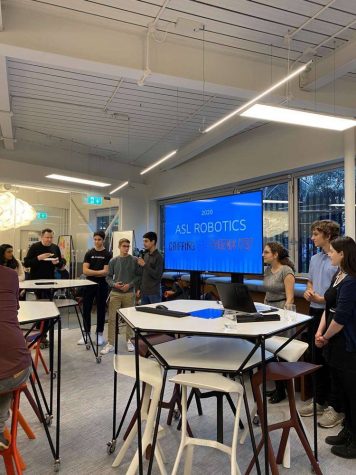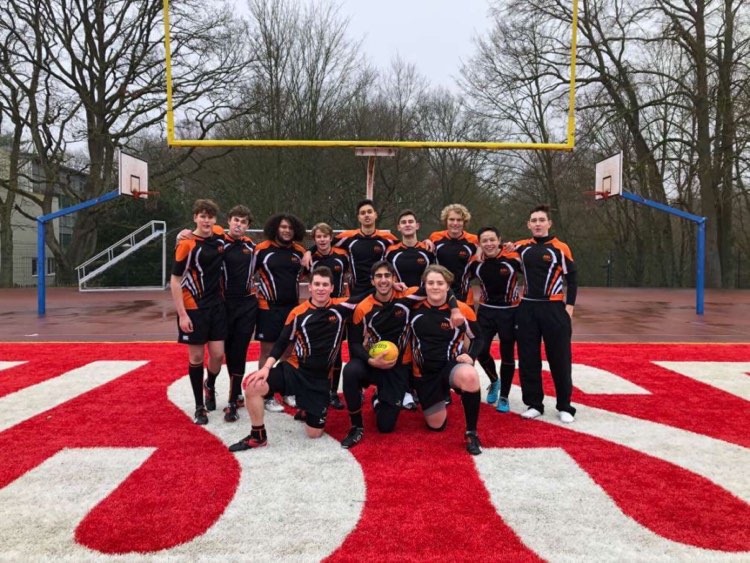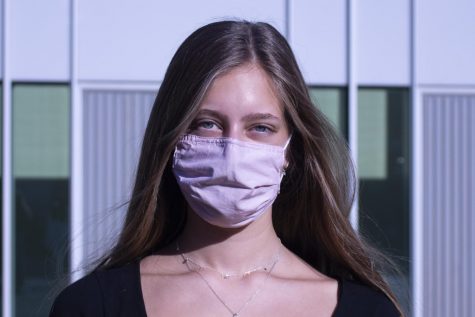Robotics and athletics both take up many hours after school almost every day. However, Owen Humphries (’22) does Robotics, and plays on the varsity rugby team, as well as being a part of the Debate Team.
Humphries said that his schedule is, at times, a difficult balancing act.
“It’s difficult to fit in homework as well as doing all of that, and then also making sure that I am present,” he said. “For rugby, making sure that I am present and being a part of the team and making sure that they can rely on me [is important], but also the same for Robotics.”
Humphries added that learning to prioritize has been an important aspect of his extracurricular endeavors.
“I often have to compromise between the clubs and trying to find time for them,” he said.
Science Teacher Brad Moore said that this balancing act is quite common for students as there are so many extracurriculars to choose from.
“There are so many [activities] here that are good,” he said. “It’s a huge smorgasbord of great treats, and you would engorge yourself if you tried to suck from every single possibility.”
However, Moore said that the endless opportunities means that students must be more thoughtful when choosing their extracurriculars.
“You have to be very judicious in picking things that you know you’re really comfortable with that keep you happy, and try a lot of things that are on the edge,” he said. “It’s best to take the risks now when there’s more support if you do happen to tumble.”
“There are so many [activities] here that are good. It’s a huge smorgasbord of great treats, and you would engorge yourself if you tried to suck from every single possibility.”
— Science Teacher Brad Moore
Director of Athletics John Farmer said that he agrees with Moore in that the school offers countless activities. He said that he hopes students don’t solely focus on athletics, even though they are both time consuming and popular.
“At a school like this that has so many amazing opportunities for kids, I’d hate for them to only be able to do athletics if they have other passions, like Robotics or Model United Nations or community partnerships,” he said. “I don’t want them to feel like they have to sacrifice one for the other.”
Farmer said that it is for this reason that he and other members of the administration decided to make Thursdays no-sport days in fall, 2017.
“Two or three years ago we moved to no Thursdays for athletics in the High School … and there’s been nothing but good feedback with allowing students to be able to pursue other things,” he said.
However, Farmer said that he recognizes that scheduling is still difficult even with free Thursdays, as students tend to use that time to focus on other extracurriculars, leaving little time for themselves.
“There’s also an irony to that where I say that already the students are heavily scheduled, and then for the one free day that they would have to go do another activity instead of getting rest or doing homework,” he said.
Nevertheless, like Moore, Farmer said that he sees the value of experimenting with different extracurriculars in high school, and said he believes the no-sport Thursdays allow students to achieve this goal.
“[No sports on Thursdays] certainly allows people to find out what they really want to do and make choices, and not just assume that when they played sports in middle school that means they have to go play sports in high school,” he said. “There are other things to go check out and do and experience, and I’d like to think that that balance is there and available for students.”
Daya Benami (’20) said that she chose her many extracurricular activities based on her main interests. For example, Benami said that she does Model United Nations and is an editor of the literary arts magazine, Jambalaya, because of her interest in human rights, art, literature and writing.
However, Benami said that one motivation for doing certain extracurriculars for many students is to put them on college applications, which is further elevated by comparing ones’ self to their friends.
“This being a … very college, goal-orientated environment, there is a lot of pressure to stack your resumé,” she said. “A lot of people do a lot of things because they’re either comparing themselves to their peers or [they feel like] ‘oh, I have to do more to get into XYZ college.’”

Humphries (second from the left) at a fundraising presentation for robotics.
Although Benami said that she feels pressure to bolster her resumé for college, she said she does extracurriculars because of her passion for them.
“I love all of the things that I do, and I think that they complement each other really well,” she said. “But, there is … that element of ‘I need to do this to get somewhere else,’ not just out of pure passion or interest.”
For Humphries, he said that there are multiple reasons he does his extracurriculars. For example, he looks to gain public speaking skills in Debate and wants to be a part of a team through rugby. However, he said that college is definitely a main motivator.
“Showing that I’m consistent in sports and robotics and debate and all of that is, of course, going to go on my applications for college,” he said. “There’s both kind of academic and personal reasons.”
Although Benami knows this is easier said than done, she said that students should try to focus on their passions and less on their college CV.
“Some people kind of see extracurriculars as these checkmarks,” she said. “But, I feel like trying to align your extracurriculars to fit a certain college profile is not healthy because you’re always going to try to meet something that maybe just isn’t you.”
From a teacher’s perspective, Moore said that he agrees with Benami because taking on too many extracurriculars with college in mind is “counterproductive.”
“Experience will show that that doesn’t seem to work that well because you end up crumbling,” he said. “You try to do too many things and keep so many plates juggling, you can’t be effective at all of them, and they all take a hit, and then it’s counterproductive for the reason you wanted it to be productive.”
In addition, Moore said that teachers are well aware of the difficulties in balancing extracurriculars with school work. He said that he “empathizes” with students as he is also the assistant boys varsity basketball coach. One year, he did a shortened contract with the basketball team, so he could focus on his teaching duties.
“I said, ‘I can’t do it every day, I’m going to take one day, Tuesday’s, where I have to be a full-time teacher and not do any of this stuff,’” he said. “I actually had to force that into my schedule because I had trouble doing 12 hour, 14 hour days, which is what an athlete probably has to do during the season.”
“Some people kind of see extracurriculars as these checkmarks. But, I feel like trying to align your extracurriculars to fit a certain college profile is not healthy because you’re always going to try to meet something that maybe just isn’t you.” — Daya Benami ('20)
Benami said she recognizes that teachers are aware of extracurricular time commitments, but also that they have to assign a certain amount of work for everyone, regardless of whether they do a lot of extracurricular activities or very few.
“They don’t really take [extracurriculars] too much into account when assigning work because each student has a different case,” she said. “I do a lot of things, but a lot of people might just focus more on school, so they have to standardize it.”
However, Benami said that teachers made exceptions for her when she was doing the Advanced Acting play last school year.
“When I was doing the Advanced Acting play last spring, and we had rehearsals every day until seven for two weeks, I told my teachers and … they let me hand in my homework a bit later,” she said.
On the other hand, Humphries said that, although schoolwork can be seen as of the utmost importance by teachers and students alike, extracurriculars are necessary and time-consuming, and that should be taken into account.
“I would say that it’s fair for [teachers] to assume that … school work in general should be put as a priority per se over extracurriculars, but I do also understand the importance of extracurriculars and especially for colleges and kind of self-fulfillment,” he said. “Teachers could do a lot better in taking into account the fact that many kids do incredibly time-consuming extracurriculars.”
However, Moore said that students should only take on extracurriculars if they know that they will be able to hand the big time commitments in conjunction with their school work.
“If you make the decision to take on the big chunks, you just need to make sure that you are taking on the big chunks, and hopefully have a good support system in place, so when you do get stressed you can complain to other people,” he said.
Ultimately, Moore said that his best advice is to try new things but make sure you have time for yourself.
“To quote my mother, … ‘you can’t have everything you want, but you can have anything you want,’” he said. “The implication is, ‘don’t do everything, do the things that you want.’”





